By Devon O’Neil
When Mayor Frank Kuntz was growing up in Wenatchee, he used to walk to elementary school through a pair of apple orchards—a commute not that uncommon in a city known as the Apple Capital of the World. Kuntz was an average Wenatchee kid—the
sixth of nine in his family—in an average American town. His dad was an attorney; his mom, a homemaker. Wenatchee’s population at the time was 17,000—less than half of what it is now. Bitcoin mines had yet to be invented. Robots
moving fruit around a warehouse might as well have been a story line in The Jetsons.
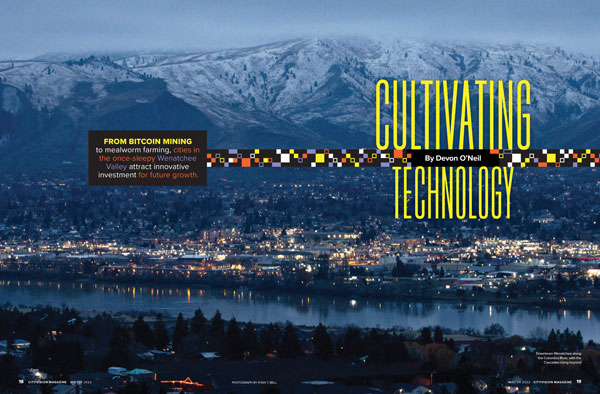
As technology took hold, this sleepy recreational paradise at the confluence of the Columbia and Wenatchee rivers—where people spend summers relaxing on Lake Chelan and winters skiing at Mission Ridge Resort, 30 minutes from downtown— began
to change. And as Kuntz, youthful-looking in middle age with short, graying hair and a warm smile, says, “You’d rather have a community growing instead of shrinking.”
Kuntz is 58 now, a successful CPA and in his third term as Wenatchee’s mayor. In recent years, like many of his colleagues in other municipalities, he’s watched the entire Wenatchee Valley and much of North Central Washington pivot toward
technology: recruiting and hosting data centers worth hundreds of millions of dollars, supporting agriculture streamlined by automation, welcoming digital currency mines that use impossibly complicated algorithms to mint virtual specie. It used to
be that people from smaller towns like Quincy, 35 minutes southeast on Highway 28, commuted to Wenatchee for work. Now, Wenatchee residents clog that same road driving the opposite way to work in Quincy-based data centers owned by the likes of Microsoft,
Yahoo, Vantage, and H5—whose lucrative property taxes have helped to build new schools and city buildings in a region riding a tech-fueled wave of prosperity. “It’s totally backward from what it used to be,” Kuntz says.
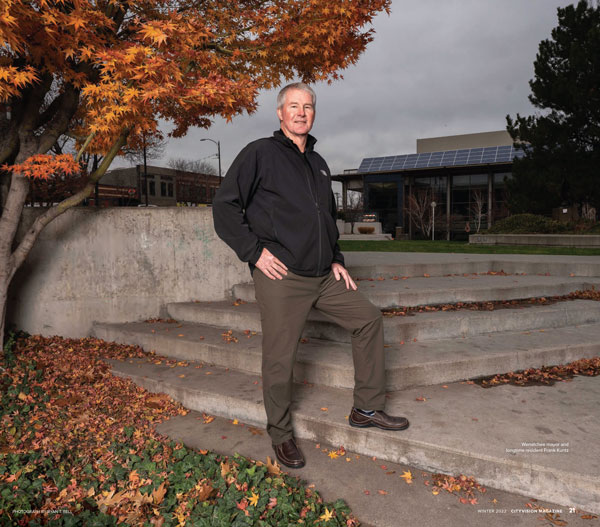
More precisely, the opportunities derive not just from one technology industry, as it were, but from many coexistent business sectors all deploying their own versions of cutting-edge tactics and innovations. But when it comes to the wow factor
of how far Wenatchee has evolved from what it was when Kuntz was a boy to what it is today, no competing example compares, in the mayor’s eyes, with the factory that moved to town three years ago.
The Diamond Foundry, a manmade diamond manufacturer, takes tiny diamonds and places them in a reactor to build much larger diamonds that are recognized as real by the Federal Trade Commission. It is the world’s first zero-carbon-footprint diamond
maker, valued at $1.8 billion and backed by, among others, Leonardo DiCaprio. Six years after its founding in the global tech epicenter of San Francisco, the company leased three acres and a building from Stemilt, a leading apple and pear grower and
legacy business in the valley. Its new MegaCarat foundry aims to quintuple production in Wenatchee by the end of 2022, up to 5 million carats per year.
“Think about it,” marvels Kuntz. “We’re growing diamonds in downtown Wenatchee. That’s a big difference from growing apples.”
But the transformation is actually not that surprising, if you consider all of the ingredients available and necessary to produce diamonds. Most of North Central Washington is hydro powered by the Columbia River, which splits Wenatchee
and East Wenatchee as well as Chelan and Douglas counties and which also provides irrigation for the crops that have anchored the region’s economy for generations. “The same things that are good for apples are also good for technology,”
Kuntz says. “Cheap power, a whole bunch of water, and high-speed internet via a really good fiber optics network—you need all of that to grow a good apple and get it shipped across the country and world, and you need all that for a good
data center, too.”
Businesses pay less for real estate or office space in the valley than they would in metropolitan centers, and, though maybe not as much now that remote work has become ubiquitous, they also reduce costs by tapping a cheaper labor pool. This means that
start-ups trying to stretch their dollars as much as possible get a lot more overall bang for their buck than they would in a traditional tech headquarters on the rainy side of the Cascades.
The Wenatchee Valley also cultivates a wealth of institutional support behind the scenes, from both municipal and private agencies intent on growing the region’s tech presence. One of the most active is the Chelan Douglas Regional Port Authority
(CDRPA), a first-of-its-kind collaboration governed by six commissioners representing Chelan and Douglas counties. CDRPA, which bills itself as the valley’s “principal economic development agency,” finds and develops commercial infrastructure
(including tracts once deemed undevelopable), networks with cities and state agencies, issues tax-exempt financing through industrial revenue bonds, secures grants, and recruits businesses to the Wenatchee Valley—most notably giant data centers
that host servers for global tech brands. “Our number one goal is to support our local businesses that are already here and make sure they’re healthy and growing,” says CDRPA Economic Development Director Ron Cridlebaugh, who notes
that the Port, as the associate development organization for both counties, serves as the Washington State Department of Commerce’s “boots on the ground” serving Wenatchee Valley communities. “Then we focus on business recruitment.”
Their financial contribution is really important to us, because it demonstrates their faith and confidence in the work that we do.
– Jenny Rojanasthien, NCW Tech Alliance
Perhaps the primary catalyst responsible for the valley’s punching above its weight, however, came from the nonprofit sector. Founded in 1999 as the Greater Wenatchee Area Technology Alliance and rebranded as the NCW Tech Alliance in 2021, this
incubator and economic development force now serves Adams, Chelan, Douglas, Ferry, Grant, and Okanogan counties. It plays myriad roles in fostering a robust tech sector, from marketing the area to hosting educational events and providing technology
resources for entrepreneurs. And it’s funded by organizatons in the private and public sectors, including the the municipalities in which it operates.
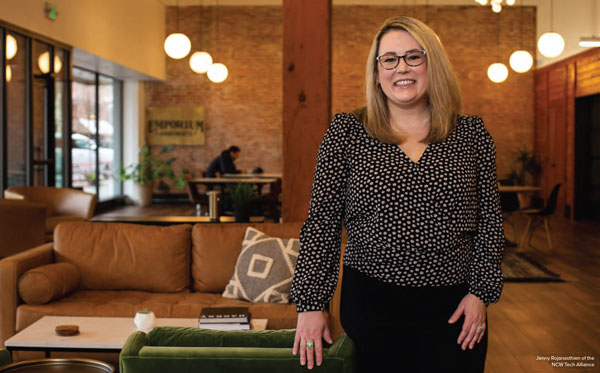
The City of Wenatchee gives $20,000 a year to the Alliance and is one of the organization’s most significant backers, if not one of its richest. “Their financial contribution is really important to us, because it demonstrates their faith and
confidence in the work that we do,” says Alliance Executive Director Jenny Rojanasthien from a soundproof phone booth at the Mercantile (the Wenatchee coworking space where she lights the region’s tech fuse), noting that the nonprofit’s
mission—to help connect people with technology resources—hasn’t changed since its inception 22 years ago. “We started because we wanted to educate the business community, primarily, on why the adoption of tech would be a benefit
for the future.”
Rojanasthien was the general manager of a $19 million-a-year Target store in Wenatchee before being hired in 2015 as the Tech Alliance’s first paid employee. At the time, the organization’s operating budget was less than $80,000, and it produced
10 events annually to promote tech. Within four years, the Alliance had three full-time employees, an operating budget of over $300,000, 45 events on the calendar, and a sponsorship from Microsoft.
We saw a lot of value in being closer to customers, and Chelan County has some of the most affordable electricity in the country.
– Virginia Emery, Founder, Beta Hatch
As it and the regional tech scene grew, the Alliance also served as a facilitator by creating opportunities for entrepreneurs and investors to network, learn, and connect. The thought was that if North Central Washington were to be known as a tech hub,
it needed local investors to support the start-ups that the Alliance and others were courting. In 2017, Rojanasthien helped form the Flywheel Angel Network (FAN) and launch the Flywheel Investment Conference, an annual event where start-ups compete
for an investment award provided by FAN’s fundraising efforts. Not surprisingly, she learned, most potential tech investors in rural Washington aren’t aware that they are potential investors. Rojanasthien saw an opportunity.
“The SEC regulates who can be an angel investor,” she says. “You have to make $200,000 as an individual or $300,000 as a couple, or have a million dollars in assets outside of your primary home. We’ve done a good job of recruiting
a lot of angel investors who are new to investing.” Over four years, the network has raised $675,000, with participation from Wenatchee to Leavenworth. “We have retired schoolteachers in our network who wrote their first checks and are
excited to be in the start-up space,” Rojanasthien says.
The Flywheel Investment Conference, meanwhile, attracts entrants from across Washington state with a six-figure prize (the winner in 2021 received $150,000, with the runner-up taking home $50,000)—and the promise of invaluable visibility among a
crowd of influencers that continues to grow each year. “By bringing these companies here,” Rojanasthien says, “we believe the byproduct in 15 years will be a lot more companies wanting to be here or start up here.”
The list of tech firms that wield global relevance from North Central Washington is already long and wide-ranging. You’ll find everything from Legwork, a Wenatchee start-up that builds dental marketing software and has landed on
Inc. Magazine’s list of the fastest-growing private companies in America the past three years; to AgTools, a homegrown, highly sophisticated platform that helps cut farmers’ losses due to wasted food; to PetHub, a tech-driven
pet ID company with a rapidly growing following; to Moses Lake–based Stoke Space Technologies, which manufactures reusable rockets to deliver satellites into orbit.
When asked what she says to prospective companies that are considering either starting in or relocating to the Wenatchee Valley, Rojanasthien says, “I sell them first and foremost on the fact that there’s a community here that wants to see
entrepreneurs be successful.”
Few community members personify that better than Virginia Emery and Beta Hatch, the biotech and engineering company that Emery founded in SeaTac in 2016. Emery, a self-described “insect entrepreneur” with a PhD, introduced a new way to grow
mealworms en masse as a cost-effective and environmentally sustainable animal food (everything from chickens to fish) and fertilizer. “But along with all the challenges of scaling a manufacturing business in a very expensive place,” she
says, “we saw a lot of value in being closer to customers, and Chelan County has some of the most affordable electricity in the country.”
After looking for a space, Beta Hatch moved into a former fruit juice factory in Cashmere, a second class city of 3,000 between Wenatchee and Leavenworth. Cashmere is a polar opposite of the municipalities Forbes recently touted as the nation’s
top five emerging tech cities (Tampa, Miami, New York City, Austin, San Francisco)—a community of quiet, leafy streets surrounded by mountains, with a city government that employs 11 and runs on a $4 million budget. “We still are a small
town, a place where you know what’s going on,” says Mayor Jim Fletcher, a retired business consultant who has lived in Cashmere for 26 years. “We don’t have the hustle and bustle of Wenatchee or the tourism of Leavenworth.
But I can go out my door and hop on a bicycle and ride up a mountain trail.”
Still, as Beta Hatch has proved, that doesn’t mean it’s not suited for a cutting-edge company. Emery, who lives in nearby Leavenworth, has raised more than $30 million since 2016 through private investments as well as state and federal grants
(and, in 2019, $135,000 from the Flywheel Investment Conference, where she took first place). Intent on scaling up rapidly, this past August she announced a $10 million investment to kick-start an expansion of the Cashmere factory from 40,000 square
feet to hundreds of thousands (if not close to a million, she hopes) by 2023. Among other implications, the expansion promises to yield a property tax windfall for the regional site selected by Beta Hatch, which could make Cashmere a small-town tech
story unto itself.
Beta Hatch cultivates “billions if not trillions” of inch-long mealworms at its factory at any given time, and it relies heavily on robots to tend to them. It captures heat waste from a bitcoin mine’s computers next door—there
are two bitcoin mines in town, both of which pay hefty utility taxes, Fletcher says—using the excess energy to keep its bugs warm, and it nourishes them with compost waste from local apple manufacturers. Though Cashmere’s nimble government
isn’t a game-changer, it does make permitting simpler and swifter, Emery says, which aids her efficiency.
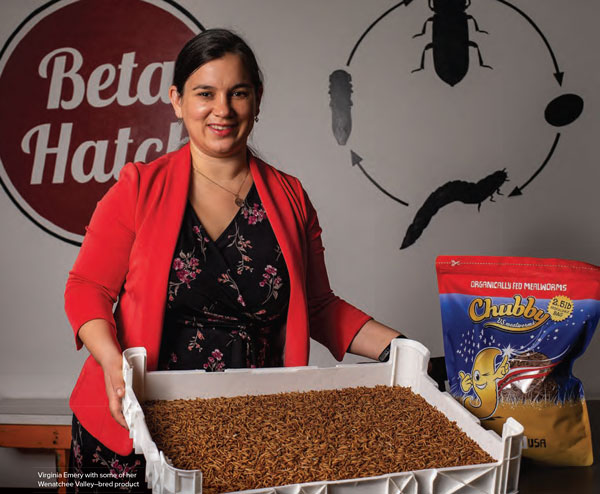
“I think there’s a huge opportunity in tech for the Wenatchee Valley because it has very affordable and reliable energy, exciting colocation of data centers, plus potential customers in fruit producers,” adds Emery, a rock climber who
named the company after her passion (“beta” is a term climbers use for the strategy to attack a difficult move) and personally chose to move to Cashmere from Seattle to have easier access to mountain crags. “We want to be in a great
place to live that has a strong labor market and the ability to retain talent, and these are all things that we love about this valley. The Wenatchee Valley could be the future hub of controlled-environment agriculture.”
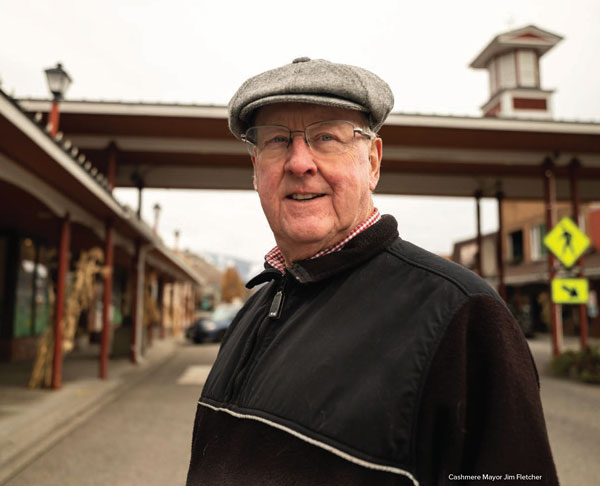
Back in the valley’s heart, City of Wenatchee Executive Services Director Laura Merrill, who took her job in February 2020, just before coronavirus exploded, says Wenatchee has seen a surge in sales tax revenue over the past two
years despite pandemic disruptions. The city has maintained its staff (194 full-time employees) and a $34 million general-fund budget. It is still the valley’s urban center, home to the regional hospital and its primary retail nexus. And, signaling
its commitment to a diversified future, the city is still contributing $20,000 a year to the NCW Tech Alliance. “We know technology is our friend, and whenever the opportunity arises, we try to embrace it,” Merrill says.
Kuntz, who’s been Wenatchee’s mayor since 2012, believes the pandemic has not only helped infuse new tech jobs and spending but also provided further stability to a region once solely reliant on agriculture and tourism. “I think you
want people to live in your community who have disposable income and want to spend their time here, and quite frankly, during Covid our region has been sort of a net winner in terms of people moving to this area and wanting to get out of urban areas—and
bringing money with them and hopefully bringing businesses and jobs,” Kuntz says.
So Kuntz makes it a point to show up every year at the Flywheel Investment Conference and personally welcome the attendees, despite not being a techie himself. “It’s as much about supporting tech as it is about the people who come from all
over the Pacific Northwest—tech-driven business owners and entrepreneurs—to spend three days in Wenatchee,” he says.
“They start thinking about what a great community we have and how they might be able to bring a portion of their business to Wenatchee. I can’t get that in any other way.”
While Kuntz misses the Wenatchee of his youth, when he would stroll through orchards to get to school, as mayor he understands that fostering technology and innovation, and the growth they bring, is what will put the entire Wenatchee Valley on a sustainable
trajectory for the future.
“We’re always going to be growing apples and pears and cherries in this community, and I’ll always be excited to have them here,” he says. “But Beta Hatch and Microsoft are great, too. This is about long-term vitality.”